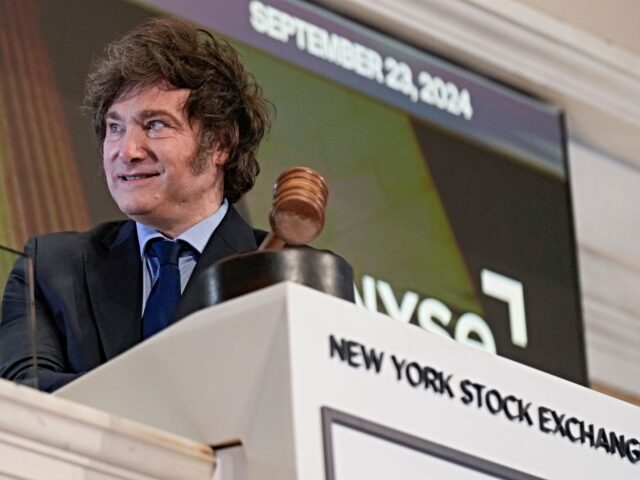The central bank of Argentina reported on Monday foreign currency deposits have surged by about $8 billion under the policies of libertarian President Javier Milei.
Foreign currency deposits were sitting at $16.5 billion when Milei took office in December. Ten months later, Argentina has $24 billion in foreign currency, including dollars once hidden or hoarded offshore by Argentines.
Milei offered to let Argentines bring up to $100,000 from their cash stashes back into the banking system without penalty, provided they made the deposits by September 30. Argentina’s banks report opening 100,000 tax amnesty accounts since the program took effect in July, with at least $2 billion in deposits.
Deposits are reportedly accelerating as the end of the amnesty period approaches, but even the impressive figures reported on Monday are just a drop in the ocean of cash Argentines were sheltering from their hyperinflationary socialist economy before Milei came along. The people of Argentina have hidden an estimated $258 billion in U.S. currency outside their financial system over the years, sometimes by literally stuffing bills into their mattresses or tucking wads of cash into safety deposit boxes.
Most people in Argentina are paid in local pesos but, for years, they have rushed to buy dollars as fast as they could and hide those dollars where the government could not find them. Milei said during his campaign that he would like to eliminate the peso entirely and dollarize the Argentinian economy.
Besides allowing the people to openly use the currency they clearly prefer, the libertarian reformist president suggested that dollarization would strip Argentina’s banks of the ability to print reams of money every time the government wants to spend more.
Milei and his economic team hope that bringing that money back into Argentina’s banking system will not only brighten the books with dollar signs, but also give people the confidence to make long-delayed major purchases.
Buenos Aires tax expert Sebastian Dominguez said in early September that the foreign currency amnesty was “a very low-cost opportunity for people to buy a car, renovate their home or start generating returns on the dollars that today are stuck in a safety-deposit box.”
Foreign Affairs took a skeptical look at the current status of Milei’s reforms on Monday, noting that he has not made much progress toward keeping his dollarization promise. The magazine claimed his instructions to use national money reserves to buy dollars – lowering their price and closing the nearly 100 percent gap between official and black-market values for U.S. currency – has made investors nervous about “Argentina’s ability to pay its sovereign debts.”
Furthermore, Milei was hoping his tax amnesty plan would attract foreign investment, but that has not happened on any significant scale. With midterm elections approaching next year, Foreign Affairs suggested Milei is hoping Donald Trump will return to the White House and pressure the International Monetary Fund (IMF) to pledge more money to Argentina, as Trump did in 2018.
“Even if Milei manages to obtain a plurality of legislators in Argentina’s next midterm election, it will only be his first step toward achieving his goals. Unless he finds a way to win the fight against foreign currency shortages, he, too, will fall victim to Argentina’s economy,” the article glumly concluded.
On the other hand, Bloomberg News noted on Wednesday that Argentina’s economy grew much faster than expected in July, posting 1.7 percent growth instead of the 0.6 percent anticipated by economists.
“South America’s second-biggest economy is showing incipient signs of recovery, with wage growth edging above inflation for three straight months in June and consumer spending and manufacturing showing gains in recent months,” Bloomberg reported.
Perhaps the ultimate example of mixed news for Milei is that his policies have brought inflation down to about 4 percent, an achievement once thought impossible – but his approval ratings are slipping because Argentines are now more worried about unemployment than inflation. Priorities are clearly shifting now that Milei’s constituents no longer keep their dollars stuffed in their mattresses.

COMMENTS
Please let us know if you're having issues with commenting.